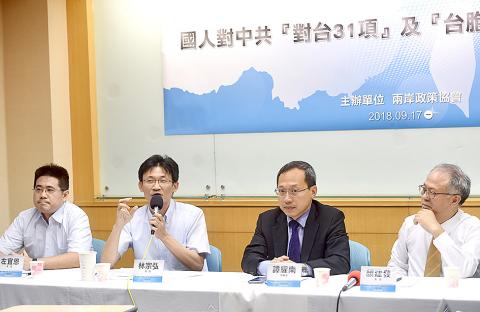About 60 percent of respondents in a poll said that holders of new Chinese residency cards should report to and be regulated by the government, the Cross-Strait Policy Association said yesterday.
The poll showed that 59.6 percent of respondents would support a requirement that cardholders report to local authorities, while 30.4 percent disagreed, association president Stephen Tan (譚耀南) told a news conference in Taipei yesterday.
Asked whether they would support the government imposing regulatory measures or restrictions on cardholders, 58.4 percent said they would, whereas 37.4 percent said they would not.

Photo: Chien Jung-fong, Taipei Times
Fifty-nine percent of respondents said they agreed that applying for the card entails privacy risks, given China’s strict surveillance of its citizens, compared with 34.4 percent who disagreed.
When asked whether the residency card would affect Taiwanese voters’ political leanings, 47.1 percent of respondents said it would, while 47.2 percent said it would not.
The poll found that 60.9 percent of respondents knew about China’s residency cards for Taiwanese, while only 42.9 percent said they knew about the so-called “31 incentives” aimed at attracting Taiwanese professionals and businesses unveiled by China’s Taiwan Affairs Office in February.
Of the respondents, 58.1 percent said the incentives threaten Taiwan’s sovereignty, as well as businesses and people, while 35.7 percent said they disagreed.
A majority of respondents agreed that the government should improve the nation’s competitiveness by launching initiatives to reward talent and bolster industrial innovation as countermeasures against China — with 82.6 percent saying they agreed and 12.6 percent saying they disagreed.
Meanwhile, 74.8 percent said they agreed that the government should improve its regulation of cross-strait exchanges, including measures to protect trade secrets and review mechanisms for cross-strait visits, compared with 18.9 percent who disagreed.
Asked whether the Republic of China represents the “status quo,” the “bottom line of the nation’s sovereignty” and the most agreed-upon term to represent Taiwanese, 68.3 percent said they agreed, while 20.4 percent disagreed.
A majority of respondents agreed with the statement regardless of their political leanings, Tan said.
The poll results suggest that people are apprehensive about China’s measures, National Taiwan Normal University Graduate Institute of Political Science professor Fan Shih-ping (范世平) said.
“While more than 20,000 Taiwanese are said to have applied for the residency card, it is a small number, given that there are 1 million Taiwanese businesspeople and students living in China,” he said.
Most Taiwanese have not applied due to privacy and taxation concerns, he said, adding that some are worried their fingerprints might be shared with intelligence agencies, even though the Taiwan Affairs Office has said they would not.
That more than 30 percent of respondents opposed the government regulating cardholders suggests that the government needs to raise awareness of the risks involved in applying for the card, Chien Hsin University of Science and Technology Department of Business Administration professor Yan Jiann-fa (顏建發) said.
“The government should explain them to the public in more detail. After all, these are unilateral policies from China and the devil is in the details,” he said.
The poll was conducted by telephone from Tuesday to Saturday last week and collected 1,071 valid samples.

SECURITY: As China is ‘reshaping’ Hong Kong’s population, Taiwan must raise the eligibility threshold for applications from Hong Kongers, Chiu Chui-cheng said When Hong Kong and Macau citizens apply for residency in Taiwan, it would be under a new category that includes a “national security observation period,” Mainland Affairs Council (MAC) Minister Chiu Chui-cheng (邱垂正) said yesterday. President William Lai (賴清德) on March 13 announced 17 strategies to counter China’s aggression toward Taiwan, including incorporating national security considerations into the review process for residency applications from Hong Kong and Macau citizens. The situation in Hong Kong is constantly changing, Chiu said to media yesterday on the sidelines of the Taipei Technology Run hosted by the Taipei Neihu Technology Park Development Association. With

CARROT AND STICK: While unrelenting in its military threats, China attracted nearly 40,000 Taiwanese to over 400 business events last year Nearly 40,000 Taiwanese last year joined industry events in China, such as conferences and trade fairs, supported by the Chinese government, a study showed yesterday, as Beijing ramps up a charm offensive toward Taipei alongside military pressure. China has long taken a carrot-and-stick approach to Taiwan, threatening it with the prospect of military action while reaching out to those it believes are amenable to Beijing’s point of view. Taiwanese security officials are wary of what they see as Beijing’s influence campaigns to sway public opinion after Taipei and Beijing gradually resumed travel links halted by the COVID-19 pandemic, but the scale of

A US Marine Corps regiment equipped with Naval Strike Missiles (NSM) is set to participate in the upcoming Balikatan 25 exercise in the Luzon Strait, marking the system’s first-ever deployment in the Philippines. US and Philippine officials have separately confirmed that the Navy Marine Expeditionary Ship Interdiction System (NMESIS) — the mobile launch platform for the Naval Strike Missile — would take part in the joint exercise. The missiles are being deployed to “a strategic first island chain chokepoint” in the waters between Taiwan proper and the Philippines, US-based Naval News reported. “The Luzon Strait and Bashi Channel represent a critical access

Pope Francis is be laid to rest on Saturday after lying in state for three days in St Peter’s Basilica, where the faithful are expected to flock to pay their respects to history’s first Latin American pontiff. The cardinals met yesterday in the Vatican’s synod hall to chart the next steps before a conclave begins to choose Francis’ successor, as condolences poured in from around the world. According to current norms, the conclave must begin between May 5 and 10. The cardinals set the funeral for Saturday at 10am in St Peter’s Square, to be celebrated by the dean of the College